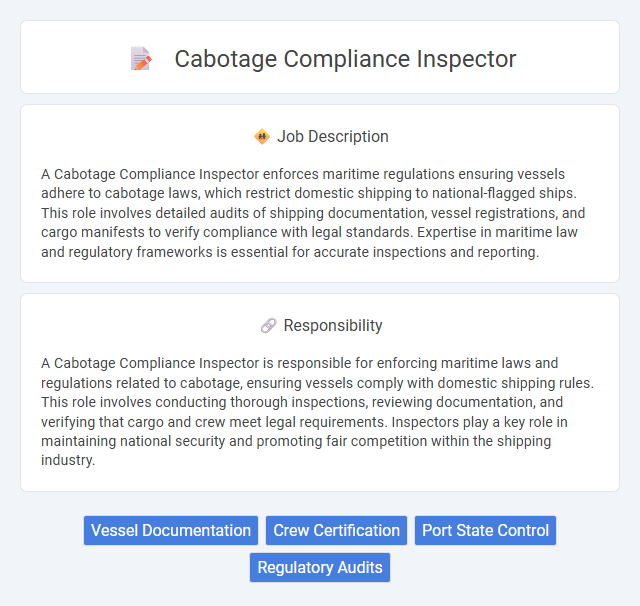
A Cabotage Compliance Inspector enforces maritime regulations ensuring vessels adhere to cabotage laws, which restrict domestic shipping to national-flagged ships. This role involves detailed audits of shipping documentation, vessel registrations, and cargo manifests to verify compliance with legal standards. Expertise in maritime law and regulatory frameworks is essential for accurate inspections and reporting.
Individuals with strong attention to detail and a solid understanding of maritime law are likely suitable for a Cabotage Compliance Inspector role. Those who are adaptable, possess excellent communication skills, and can handle regulatory environments may find success in this position. People with a preference for routine and minimal interpersonal interaction might face challenges working effectively as a Cabotage Compliance Inspector.
Qualification
A Cabotage Compliance Inspector must possess a thorough understanding of maritime laws and regulations, particularly those related to cabotage laws such as the Jones Act and other domestic shipping statutes. Candidates typically require a background in maritime enforcement or regulatory compliance, often demonstrated by relevant certifications and experience in vessel inspections or port operations. Strong analytical skills, attention to detail, and the ability to interpret complex legal documents are essential for ensuring vessels and operators comply with national cabotage requirements.
Responsibility
A Cabotage Compliance Inspector is responsible for enforcing maritime laws and regulations related to cabotage, ensuring vessels comply with domestic shipping rules. This role involves conducting thorough inspections, reviewing documentation, and verifying that cargo and crew meet legal requirements. Inspectors play a key role in maintaining national security and promoting fair competition within the shipping industry.
Benefit
The probability of securing a Cabotage Compliance Inspector job may lead to significant benefits, including enhanced regulatory knowledge and expertise in maritime transportation laws. Candidates might gain increased job stability and opportunities for career advancement within the shipping and logistics industries. Additionally, this role often provides a sense of contribution towards national economic security by ensuring adherence to cabotage regulations.
Challenge
The role of a Cabotage Compliance Inspector likely involves navigating complex regulations to ensure domestic shipping laws are upheld, which presents a significant challenge due to constantly evolving policies and diverse stakeholders. Inspectors probably face difficulties in verifying compliance across various vessels and routes, requiring meticulous attention to detail and strong analytical skills. Managing potential conflicts between commercial interests and legal requirements may also add to the job's challenging nature.
Career Advancement
Cabotage Compliance Inspector roles offer significant career advancement opportunities within maritime regulatory agencies and shipping companies, enabling professionals to specialize in national maritime laws and trade regulations. Mastery of cabotage laws enhances eligibility for senior compliance, policy advisory, and maritime safety positions. Continuous training and certification further accelerate career growth by expanding expertise in vessel operations, cargo security, and environmental compliance.
Key Terms
Vessel Documentation
A Cabotage Compliance Inspector specializes in verifying vessel documentation to ensure adherence to national cabotage laws governing domestic shipping routes. Their responsibilities include thorough inspection of vessel registration papers, crew nationality certificates, and cargo manifests to confirm compliance with maritime regulations. Accurate documentation review helps prevent illegal foreign vessel operation and supports enforcement of domestic maritime labor and safety standards.
Crew Certification
Cabotage Compliance Inspectors specialize in verifying that all crew members hold valid certifications as mandated by maritime law, ensuring legal adherence during domestic shipping operations. They meticulously review documentation such as seafarer identification, training certificates, and competency evaluations to confirm compliance with national cabotage regulations. Maintaining updated records of crew certification prevents operational delays and enforces safety standards in coastal and inland waterway transport.
Port State Control
Cabotage Compliance Inspectors enforce maritime laws by ensuring vessels adhere to domestic shipping regulations within a nation's territorial waters. Their role is critical in Port State Control operations, where they inspect foreign ships to verify compliance with safety, environmental, and labor standards. These inspectors utilize detailed audits and documentation reviews to prevent unauthorized cabotage activities and protect national shipping interests.
Regulatory Audits
A Cabotage Compliance Inspector conducts thorough regulatory audits to ensure adherence to maritime laws governing the transport of goods within a country's coastal waters. These audits focus on verifying vessel documentation, cargo manifests, and operator licenses to prevent unauthorized foreign shipping activities. Inspectors utilize detailed inspection checklists and regulatory frameworks from agencies like the Federal Maritime Commission to maintain strict compliance with cabotage laws.
 kuljobs.com
kuljobs.com